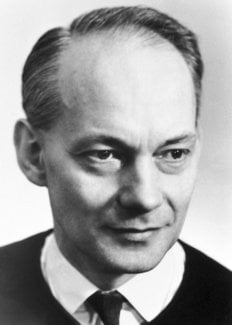Manfred Eigen
Biographical

Manfred Eigen was born in Bochum on 9 May 1927, the son of the chamber musician Ernst Eigen and his wife Hedwig, née Feld. He received his schooling at the Bochum humanistic Gymnasium.
In the autumn of 1945 he commenced the physics and chemistry course at the Georg-August University in Göttingen and obtained his doctorate in natural science in 1951. He wrote his dissertation on the specific heat of heavy water and aqueous electrolyte solutions under the guidance of Arnold Eucken. After two years as an assistant lecturer at the physical chemistry department of the university under Ewald Wicke, he transferred to the Max-Planck Institut für physikalische Chemie, which had moved to Göttingen under the Directorship of Karl Friedrich Bonhoeffer. The influence of Bonhoeffer, who provided him with magnificent working conditions at the Institut, is reflected in his later work in the field of biophysical chemistry.
Eigen began his work on the problem of fast ionic reactions in solution in the period 1951-1953, encouraged to do so by the ultrasound absorption measurements carried out by his colleagues Konrad Tamm and Walter Kurtze. During the following years he developed a series of measuring techniques involving times down to the order of a nanosecond. He developed many of these techniques with Leo de Maeyer, who joined him in the autumn of 1954, and with whom he is still collaborating closely at the Göttingen MaxPlanck-Institut. The Max-Planck-Gesellschaft appointed Eigen a Scientific Member in 1957 and head in 1964. In 1967 he was elected Managing Director of the Institute for a period of three years. At the same time he was appointed to the Scientific Council of the German Federal Republic.
Eigen’s scientific development is reflected in the close on 100 papers he has published. The subject matter of these works ranges from the thermodynamic properties of water and aqueous solutions, and the theory of electrolytes, through thermal conductivity and sound absorption, to fast ionic reactions.
In the years 1953-1963 followed the description of a series of novel measuring techniques used for the study of very fast reaction in the range from one second to one nanosecond. The gap between the region of classical reaction kinetics and spectroscopy was thus closed. Eigen was particularly interested in proton reactions: together with De Maeyer he was the first to determine the neutralization rate and found the anomalous conduction characteristics of protons in ice crystals. The development of the theory of relaxation of multi stage processes was followed by studies on metal complex reactions, in which the fast reactions of a large number of metal ions were investigated in relation to their position in the periodic table. Around 1960 the emphasis in his work shifted towards physical-organic chemistry. The individual steps of a series of reaction mechanisms were elucidated, and a general theory of acid-base catalysis was verified experimentally.
At the same time, however, his attention turned also to biochemical questions, which now claimed his chief interest. These questions ranged from hydrogen bridges of nucleic acids, through the dynamics of code transfer, to enzymes and lipid membranes. Biological control and regulation processes, and the problem of the storage of information in the central nervous system also occupy his attention. Practically every year he travels together with his friend and colleague Leo de Maeyer to Boston to discuss topics of common interest with American neurologists, biochemists, and biophysicists.
Eigen holds the following honours and distinctions: Bodenstein prize of the Deutsche Bunsengesellschaft, 1956; Otto-Hahn Prize for Chemistry and Physics, 1962; Kirkwood Medal (American Chemical Society), 1963; Harrison Howe Award (American Chemical Society), 1965; Andrew D. White Professor at large at Cornell University, Ithaca, N.Y., 1965; Honorary Professor at the Technische Hochschule, Braunschweig, 1965; Foreign Honorary Member of the American Academy of Arts and Sciences, 1964; Member of the “Leopoldina”, Deutsche Akademie der Naturforscher in Halle, 1964; Member of the Göttingen Akademie der Wissenschaften, 1965; Honorary Member of the American Association of Biological Chemists, 1966; Honorary degree of doctor of science at Harvard University, U.S.A., 1966; Honorary degree of doctor of science at Washington University, U.S.A., 1966; Foreign Associate of the National Academy of Sciences, Washington, U.S.A. 1966; Honorary degree of doctor of science, University of Chicago, U.S.A., 1966; Carus Medal of the Deutsche Akademie der Naturforscher “Leopoldina”, Halle, 1967; Linus Pauling Medal of the American Chemical Society, 1967.
Manfred Eigen is married to Elfriede, née Müller. They have two children, Gerald (born 1952) and Angela (born 1960). In his free time he is a keen amateur musician. His favorite holiday pastime is mountaineering.
This autobiography/biography was written at the time of the award and first published in the book series Les Prix Nobel. It was later edited and republished in Nobel Lectures. To cite this document, always state the source as shown above.
Manfred Eigen died on 6 February 2019.
Nobel Prizes and laureates
Six prizes were awarded for achievements that have conferred the greatest benefit to humankind. The 12 laureates' work and discoveries range from proteins' structures and machine learning to fighting for a world free of nuclear weapons.
See them all presented here.
